No Judgments Read online
Page 13
I patted her on the back as comfortingly as I could. I realized that what Drew had said to his aunt in Spanish before we’d left to pick up my bike must have been an assurance that he’d be back to hunker down for the storm with her.
Of course he’d been lying. He’d never had any intention of spending the storm anywhere but his beach house. But, like a typical male, he’d been too cowardly to tell his aunt so to her face.
“Now, Lu.” Ed had come in from the dining room and was as matter-of-fact about his nephew’s reckless choice as he was about everything else. “The boy will be fine.”
“He won’t.” Mrs. Hartwell sounded as close to tears as I’d ever heard her. “He’s going to die out there.”
“Unlikely. He’s got a boat. Worse comes to worst, he’ll get himself and those dogs of his into it and ride out the storm there.”
Understandably, this did not seem to comfort the anxious woman.
“He’s got nothing! No generator, no landline, no satellite phone—”
“He’s got his wits.” Ed walked over to the counter to check on the ropa vieja his wife was cooking for dinner, the ingredients for which had all gone into a slow cooker. The smell that emanated from it when Ed lifted the lid was so appetizing, my mouth almost watered. “Mmm, now that’s going to be delicious, Lu.”
His wife ignored this compliment. “He’s going to die.”
“He’s been through lots of these storms before, Aunt Lucy,” Nevaeh said. She’d come into the kitchen as well to see what all the fuss was about, and now she wrapped a comforting arm around her aunt’s waist. “He’ll know just what to do. Uncle Drew always does.”
Well, I wouldn’t go that far. Maybe he knew just what to do when it came to construction and hauling motorbikes.
When it came to matters of the heart, however, not so much.
Then again, I was no champ in that department, either.
It was just then that it happened: a flash of lightning so strong—accompanied by a boom of thunder at the same time, indicating that a storm cell was directly over us—that the lights flickered, then went out.
Nevaeh and Katie screamed as if their throats were being slit. The parrot, in the living room, joined them.
“No worries, no worries.” Ed puttered toward the counter, where a powerful-looking flashlight sat. It was still daytime, but the thick clouds overhead coupled with the tightly closed shutter over every window had made the house as dark inside as if it were dusk. “I had the propane in the generator topped off this morning, so we should be—”
There was a groaning sound—like a powerful boat engine starting up—and suddenly the lights flickered on again. That sound—the groaning—had apparently been the sound of the Hartwells’ generator springing to life, as it was programmed to do the minute the city’s electric grid failed. Fueled by the thousand-gallon propane tank Drew had mentioned, the Hartwell house was now being powered by its generator.
“Oh, thank God,” I heard Nevaeh cry. She’d run into the living room to check on the television. “But the cable’s completely out!”
“Yep.” Ed didn’t look particularly surprised. “Can’t believe it lasted as long as it did.”
The island’s cable television service was the source of most of the jeers in the “Cheers and Jeers” section of the newspaper. It seemed to go out weekly, even when the weather was fair, and when it was foul, forget about it. Satellite dish service was worse, because any amount of rain, even up the island chain, could knock it out. Many of my customers could predict when rain was on its way based solely on the amount of pixilation on their television screens.
Nevaeh, her face pale, came back into the kitchen, waving her cell phone in the air.
“The Internet isn’t working!”
Mrs. Hartwell managed a smile. “I’m sure you girls can live without the Internet for a few days.”
“A few days?” Katie looked as panic stricken as if someone had suggested she live without oxygen.
“You do know that some of us lived almost our entire lives without the Internet?” Mrs. Hartwell seemed amused. “I managed to graduate from high school and college without ever using it once.”
Nevaeh’s eyes widened. “How did you even have a social life, let alone do homework?”
“It was called the library.” Mrs. Hartwell didn’t look so amused anymore. “And we used something called a telephone to contact one another. You know, if you girls are bored, I’ve got a cake that needs fixing.”
Nevaeh smiled apologetically at her great-aunt. “Sorry, Aunt Lu. Of course we’ll come help you. Katie, come on, let’s go wash our hands.”
Katie followed her friend, her gaze never wavering from her phone screen. “You know, Nevaeh, there’s still cell service. I just got a text from Madison.”
Once the two girls had left the room, I smiled at Mrs. Hartwell, who was gazing after her great-niece with a look of half-concern, half-adoration.
“Are Katie’s parents worried about her being out in this weather?” I asked. Wind was sucking at the wooden shutters that covered the living room windows, causing them to creak. The walls of the house itself seemed to be swaying slightly—but Mrs. H had warned me this would happen. The house had been built to do this.
“The sheriff? Oh, no.” Mrs. Hartwell waved a hand dismissively. “He asked if she could stay here. She didn’t want to stay with him over at the high school. And who can blame her, with her dad working, and her best friend and cousin here?”
It dawned on me, slowly, that Katie was a Hartwell, too—Sheriff Hartwell’s daughter. Was everyone in this town related, by blood or marriage, to the Hartwells?
“Wasn’t there something here in the kitchen you wanted my help with?” I asked brightly. Not that I actually felt like helping. I felt like screaming, like Mrs. H had done when she’d received Drew’s text.
But since they’d been so gracious as to house me, it seemed like the least I could do.
And a project seemed like a good way to keep my mind off what was happening outside.
“Oh. Yes, actually. If you wouldn’t mind . . .”
Which was how I found myself, a half hour later, standing at the kitchen counter, using a hand mixer to stir up a batch of what Drew’s aunt called “hurricane dip.”
“It’s so addictive,” she explained to me. “You really can’t have it in the house anytime except during a hurricane. Otherwise you’d be eating it all day long.”
I believed her . . . and also knew why this wouldn’t be the best thing, at least for anyone who cared about their health, since the sole ingredients for “hurricane dip” were mayonnaise, sour cream, and cream cheese, along with “about half a bottle” of barbecue sauce.
My job was to mix all of these ingredients together until they were a light orange color, making sure there were no lumps—difficult to do, considering the cream cheese.
I tried not to ask myself why mixing together a lot of heart-attack-inducing ingredients seemed to be the job for which Drew’s aunt felt I was most suited. I did have other skills beyond food preparation . . .
But none that would be particularly useful under these circumstances. Law school didn’t exactly prepare one for a hurricane, at least not a literal one. All of that cerebral stuff was as handy in this situation as my mom deemed art to be.
The only bright spot that I could see about my being pigeonholed into the role of resident dip maker was that Nevaeh and Katie had it a lot worse. They were being forced to make the lemon pudding cake of which Drew had spoken so disparagingly, and which involved a package of yellow cake mix combined with—what else?—a package of lemon pudding.
Although, as long as you were a fan of lemon (which I was), how bad could it be?
“That looks done,” Mrs. Hartwell said, peering into the bowl I was holding. “Let’s try it and see.”
She plunged a chip—the “ruffled kind” were the best for this particular dip, she’d informed me—into the contents of the bowl and then b
rought the chip and dip to her mouth and chewed thoughtfully.
“Mmmm.” She closed her eyes, something I’d noticed she did often while eating. “Perfection.”
“Really?”
I wasn’t sure how anything made up of so many different condiments could be any good, so I grabbed a chip and tasted it, too.
I was surprised by the tangy flavor explosion in my mouth. “Oh my God.”
Mrs. Hartwell grinned at me. “You see? That’s why we can only have it around during hurricanes. Otherwise we’d all be the size of trucks. Well, I already am.” She patted her pleasantly curved belly. “But I don’t need to be getting any bigger, or I’d have to go to Miami to buy all new clothes.” There was no place to buy clothes in Little Bridge, except expensive boutiques that no locals could afford, and a Kmart on the outskirts of town. “Throw some plastic wrap on that and put it in the fridge so it can set, and then go rest up awhile. You deserve it.”
“We should eat soon,” Ed announced, wandering back into the kitchen. “The real heavy stuff is going to start coming down in an hour or so.”
His wife nodded and began filling a pot of water. I looked at him questioningly. “How do you know when the heavy stuff is going to get here? The cable is out, and there’s no Internet.”
He sent me a withering glance, then held up a small metal box. “Radio. Ever heard of it before?”
“Oh. Of course.” I flushed with embarrassment, remembering I hadn’t told him who my mother was.
But it seemed better not to, for a variety of reasons. Not everyone was a fan of Judge Justine. I didn’t know how Ed and Lucy Hartwell would feel about her.
“What kind of radio do you have?” I asked.
Ed, excited to show off his gadget, set his battery-operated shortwave radio on the counter and turned up the volume so I could appreciate the sound quality.
“Oh, Ed, no,” Mrs. Hartwell exclaimed as she rinsed the rice. “I don’t want to hear those two idiots. We were having such a nice peaceful time—”
I have no idea how anyone could describe this situation as peaceful, given how powerfully the wind outside was blowing. The shutters on the windows were all shaking, and the special pine the house was made of, despite its reputation for being so strong, was doing a bit of creaking as well.
But this apparently did not alarm the Hartwells at all.
“They aren’t idiots.” Ed sounded offended. “They are professional radio journalists who are risking their lives to stay on the air over there at the airport after everyone else has evacuated in order to bring us the weather—”
Aunt Lu snorted. “Risking their lives! They’re in a bomb shelter. The only way they’ll be risking their lives is if their broadcasting antenna blows down and one of them is stupid enough to go outside to try to repair it, which I wouldn’t be surprised to—”
“Shhhh.” Ed turned up the volume of his radio.
The voices of two men filled the kitchen.
“We’ve just clocked a wind gust of a hundred and eleven miles an hour,” one of the men—who later identified himself as Wayne the Toad Licker—said. “That definitely puts us at a Cat Three.”
“It does, Wayne,” said his cohost, whose call sign I subsequently learned was Fred the Head. “But do we want to depend on mere technical instruments? Wouldn’t we get a more accurate reading if you went out there and . . . you know?”
“No, Fred. I won’t do it.”
“You swore on the Conch Republic flag that you would!”
“Fred, I’m not a masochist. I’m not going out there.”
“Ladies and gentlemen of Little Bridge, if you’re just tuning in and wondering what my esteemed colleague and I are discussing, it’s the fact that Wayne lost a bet, and as the loser he is supposed to go out into the parking lot of our station here and attempt to measure the winds of Hurricane Marilyn by spitting into them. And yet here he is, reneging on our—”
“Oh, for pity’s sake,” Mrs. Hartwell burst out. “This is the silliest, most revolting thing I’ve ever heard. Turn it off.”
Ed only turned up the volume. “Now, Lu,” he said gravely. “These gentlemen are providing a valuable service to the community. Everyone who’s listening is having their mind kept off the storm, which is what we all need right now.” He glanced at me. “Wouldn’t you say so?”
I didn’t want to get into the middle of my employers’ marital squabble. Besides which, I was beginning to worry. The airport was less than a mile from Sandy Point Beach, where Drew was building his house. If the winds there were already up to Category 3 strength and the eye of the storm wasn’t even on us, was it remotely safe for him to be there? It didn’t seem like it.
“I mean, they seem dumb,” I said of Fred the Head and Wayne the Toad Licker. “But entertaining.”
“And informative.” Ed took a small notebook and pen from his shirtfront pocket and began jotting something down. “So, if it’s seven o’clock now, and the winds are already at over a hundred miles per hour, that means the eye should pass over at around—”
Mrs. Hartwell snapped, “Oh, for pity’s sake, Ed. I don’t want to hear it! Our nephew could be dying out there and you’re standing there estimating exactly what time it’s going to happen!”
Ed shrugged, still calculating. “I’m sorry, but it’s better to be prepared for these things.”
“Girls!” Mrs. Hartwell spun around and called to the teenagers. “Girls, come help set the table. We’re going to eat dinner soon. Although to be honest,” she turned to say to me, “I don’t think I could eat a bite, I’m so worried. You?”
“Um.” I suddenly thought of something. “Hold on a minute. I think I have just the thing.”
Chapter Seventeen
Time: 7:18 P.M.
Temperature: 77ºF
Wind Speed: 65 MPH
Wind Gust: 115 MPH
Precipitation: 3.3 in.
Oh, how thoughtful. I haven’t seen one of those in years. The girls will love it.”
That’s what Mrs. Hartwell said when I dug out my cheese ball and offered to serve it as an appetizer, since I thought it might cheer her up.
It did. Neither Nevaeh nor Katie had ever seen such a thing before, and after obediently setting the massive dining room table, as Mrs. Hartwell had asked, with her best silverware and china, they dug into the unfamiliar treat, gushing over it as enthusiastically as if I’d made it myself.
“This is the best thing I’ve ever eaten,” Nevaeh declared, shoveling port wine cheese spread into her mouth.
“Me, too!” Katie had bits of cracker stuck in her braces.
“Lu never lets me eat this stuff,” Ed said, slicing off about a third of the cheese ball for himself. “She says it’s bad for my cholesterol. Hey, where’s the hurricane dip?”
“Coming,” Mrs. Hartwell called from the kitchen, where she was warming tortillas for the ropa vieja. “Is anyone saving any of that cheese for me?”
I appreciated the brave show Drew’s aunt was putting on. I appreciated it so much that, before clearing the tray to make room for dinner, I snapped a quick photo of what was left of the demolished cheese ball and sent it to Drew Hartwell, along with the message “See what you’re missing?”
Since I knew both his aunt and uncle had tried to call and text him and received no reply, I didn’t expect a reply, either.
So I was surprised when, just as we were sitting down to dinner, I saw a text bubble appear beneath my message to him . . . three animated dots, indicating he was writing back.
Indicating that, at least for now, he was alive.
I had looked up excitedly to share this fact with the rest of the table when Mrs. Hartwell, her tone brisk but polite, said, “No cell phones at the table, please.”
“But—”
“That’s the rule!” Nevaeh smirked. “We don’t have different rules for guests. No cell phones at the table.”
Guiltily, I dropped my phone in my lap and tried to ignore Nevaeh’s and Kati
e’s giggles . . . as well as the strange sense of disappointment I felt, realizing it would be a while before I’d be able to check for Drew’s reply.
What did I care, anyway?
Unbidden, a memory of how Drew had looked, gently cradling Gary in his arms, came back to me.
And then an entirely different memory—how he’d looked earlier that day outside my apartment door, shirtless.
Anything else I can do for you, Fresh Water?
Oh my God. Maybe I did like him. Maybe I more than liked him. Why else was I so worried about him?
No. No, it wasn’t possible.
But then why else was I shoveling the food Mrs. Hartwell had so lovingly prepared into my mouth so quickly? I hardly tasted it.
And then why else did I excuse myself to go to the bathroom while everyone else was midway through their meal, only so I could check my phone to see what he’d written back to me?
And then why else did I feel such a crushing sense of disappointment in the bathroom when I saw that the text bubbles had disappeared, and that Drew hadn’t written back after all? In fact, I’d received no messages at all, not even from my mother, which was odd, considering she’d been texting me approximately once an hour. All that was written on my screen was . . .
“No service!” Nevaeh’s voice was a panic-filled shriek.
The wind was gusting more strongly than ever. On the radio—which Ed had insisted on keeping on throughout our meal—Wayne and Fred said their anemometer had broken, torn off by one of the gusts, so they now had no way of measuring how strong the winds were, aside from spitting.
“No service!” Nevaeh cried again dramatically. “I’m going to die!”
“You’re not going to die.” Dinner was over, and Mrs. Hartwell was calmly cutting slices of lemon pudding cake for dessert. “Go and get your bedding from upstairs. You and Katie are sleeping down here in the living room on the pullout couch, remember?”

 Bridal Boot Camp
Bridal Boot Camp Party Princess
Party Princess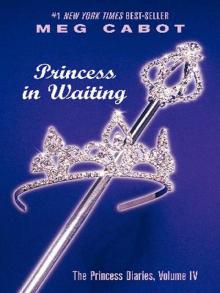 Princess in Waiting
Princess in Waiting Being Nikki
Being Nikki Abandon
Abandon Princess on the Brink
Princess on the Brink Darkest Hour
Darkest Hour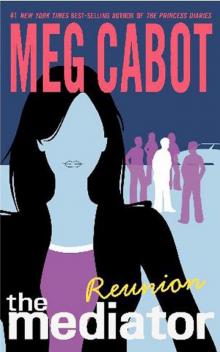 Reunion
Reunion Princess in Pink
Princess in Pink Sweet Sixteen Princess
Sweet Sixteen Princess The Princess Diaries
The Princess Diaries Airhead
Airhead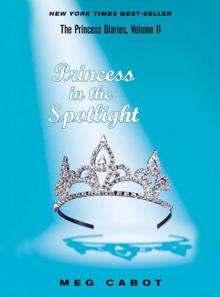 Princess in the Spotlight
Princess in the Spotlight No Judgments
No Judgments All-American Girl
All-American Girl Princess in Love
Princess in Love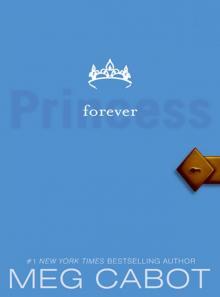 Forever Princess
Forever Princess Haunted
Haunted Shadowland
Shadowland Twilight
Twilight Princess Mia
Princess Mia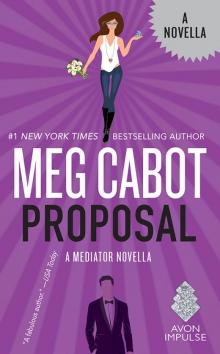 Proposal
Proposal Remembrance
Remembrance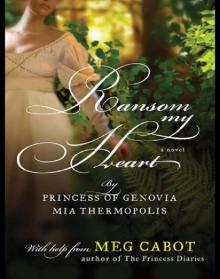 Ransom My Heart
Ransom My Heart Underworld
Underworld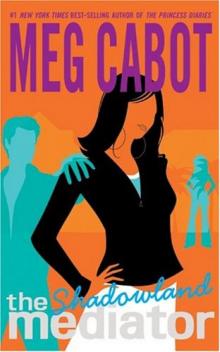 Shadowland tm-1
Shadowland tm-1 Size 14 Is Not Fat Either
Size 14 Is Not Fat Either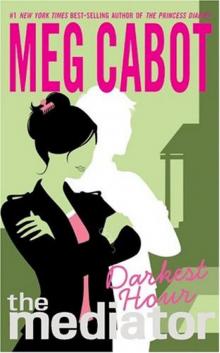 Darkest Hour tm-4
Darkest Hour tm-4 Airhead a-1
Airhead a-1 Royal Crush
Royal Crush The Princess Present (princess diaries)
The Princess Present (princess diaries)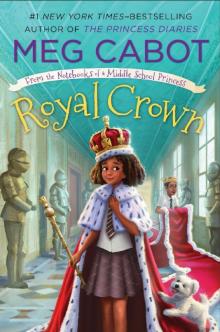 Royal Crown
Royal Crown Royal Wedding: A Princess Diaries Novel (The Princess Diaries Book 11)
Royal Wedding: A Princess Diaries Novel (The Princess Diaries Book 11)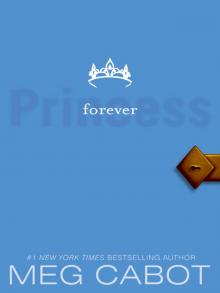 Princess Diaries, Vol. X: Forever Princess
Princess Diaries, Vol. X: Forever Princess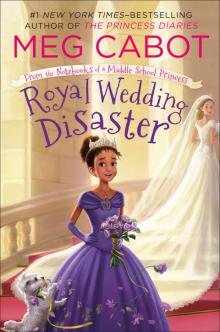 Royal Wedding Disaster
Royal Wedding Disaster Allie Finkle's Rules for Girls: Glitter Girls and the Great Fake Out
Allie Finkle's Rules for Girls: Glitter Girls and the Great Fake Out Size 12 Is Not Fat hwm-1
Size 12 Is Not Fat hwm-1 Princess on the Brink pd-8
Princess on the Brink pd-8 The New Girl
The New Girl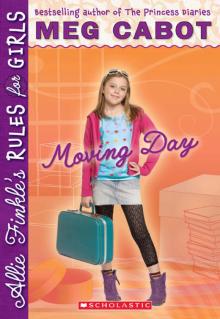 Allie Finkle's Rules for Girls: Moving Day
Allie Finkle's Rules for Girls: Moving Day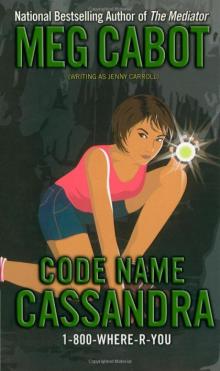 Code Name Cassandra
Code Name Cassandra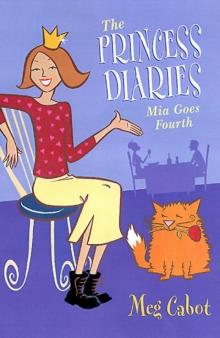 Mia Goes Fourth pd-4
Mia Goes Fourth pd-4 Sanctuary 1-4
Sanctuary 1-4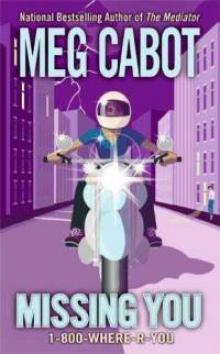 Missing You 1-5
Missing You 1-5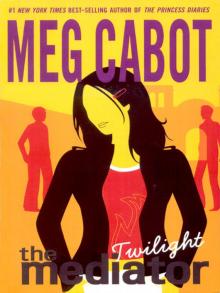 The Mediator 6: Twilight
The Mediator 6: Twilight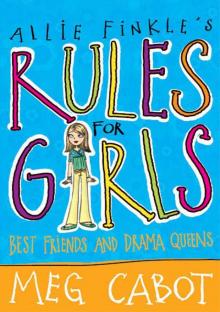 Allie Finkle's Rules for Girls: Best Friends and Drama Queens
Allie Finkle's Rules for Girls: Best Friends and Drama Queens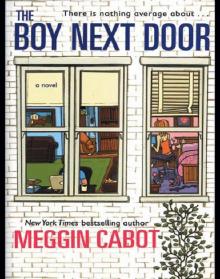 The Boy Next Door
The Boy Next Door Every Boy's Got One
Every Boy's Got One Princess Mia pd-9
Princess Mia pd-9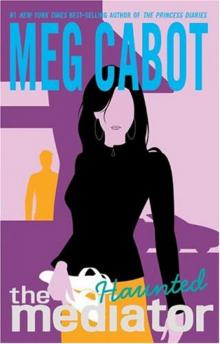 Haunted tm-5
Haunted tm-5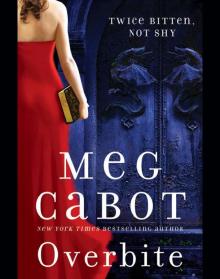 Overbite
Overbite Princess Lessons
Princess Lessons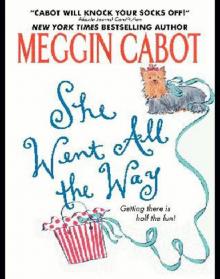 She Went All the Way
She Went All the Way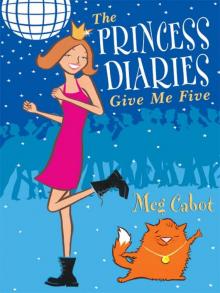 Give Me Five pd-5
Give Me Five pd-5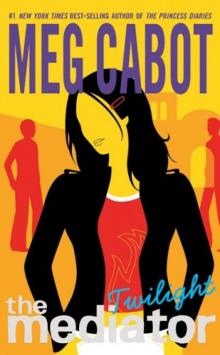 Twilight tm-6
Twilight tm-6 Jinx
Jinx Runaway (Airhead #3)
Runaway (Airhead #3) Queen of Babble Gets Hitched qob-3
Queen of Babble Gets Hitched qob-3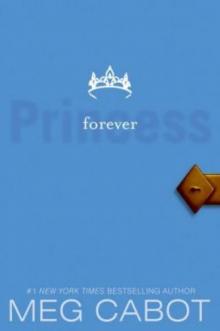 Forever Princess pd-10
Forever Princess pd-10 Queen of Babble
Queen of Babble Boy Meets Girl b-3
Boy Meets Girl b-3 Pants on Fire
Pants on Fire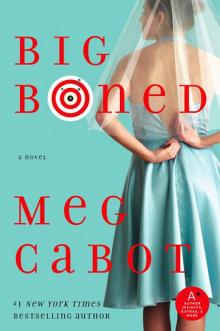 Big Boned ху-3
Big Boned ху-3 Princess' Diaries pd-1
Princess' Diaries pd-1 Size 14 Is Not Fat Either hwm-2
Size 14 Is Not Fat Either hwm-2 Awaken a-3
Awaken a-3 Queen Of Babble: In The Big City qob-2
Queen Of Babble: In The Big City qob-2 Nicola and the Viscount
Nicola and the Viscount Allie Finkle's Rules for Girls: Stage Fright
Allie Finkle's Rules for Girls: Stage Fright Size 12 and Ready to Rock
Size 12 and Ready to Rock Perfect Princess
Perfect Princess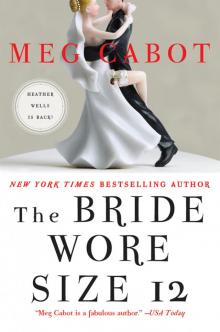 The Bride Wore Size 12
The Bride Wore Size 12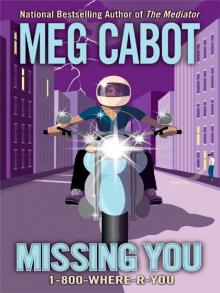 1-800-Where-R-You: Missing You
1-800-Where-R-You: Missing You How to Be Popular
How to Be Popular Queen of Babble Bundle with Bonus Material
Queen of Babble Bundle with Bonus Material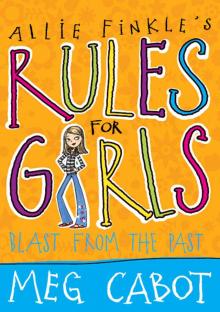 Allie Finkle's Rules for Girls: Blast from the Past
Allie Finkle's Rules for Girls: Blast from the Past Princess in the Spotlight pd-2
Princess in the Spotlight pd-2 Ready or Not
Ready or Not The Princess Diaries I
The Princess Diaries I Party Princess pd-7
Party Princess pd-7 Third Time Lucky pd-3
Third Time Lucky pd-3 Stage Fright
Stage Fright From the Notebooks of a Middle School Princess
From the Notebooks of a Middle School Princess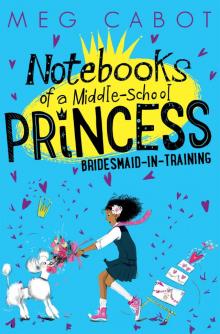 Notebooks of a Middle-School Princess Bridesmaid-in-Training
Notebooks of a Middle-School Princess Bridesmaid-in-Training Boy Meets Girl
Boy Meets Girl Missing You
Missing You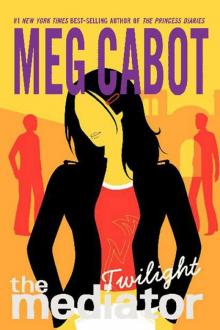 The Twilight
The Twilight Size 12 Is Not Fat
Size 12 Is Not Fat Code Name Cassandra 1-2
Code Name Cassandra 1-2 Valentine Princess
Valentine Princess Project Princess
Project Princess Reunion tm-3
Reunion tm-3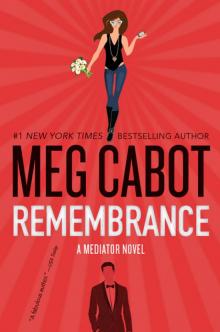 Remembrance: A Mediator Novel
Remembrance: A Mediator Novel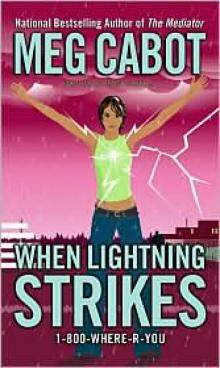 When Lightning Strikes 1-1
When Lightning Strikes 1-1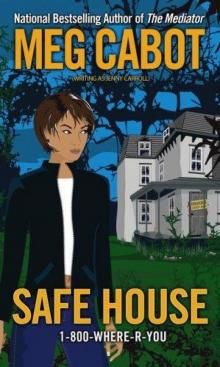 Safe House 1-3
Safe House 1-3 Teen Idol
Teen Idol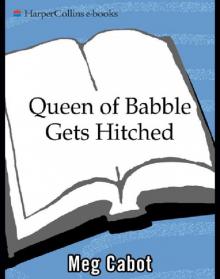 Queen of Babble Gets Hitched
Queen of Babble Gets Hitched Glitter Girls and the Great Fake Out
Glitter Girls and the Great Fake Out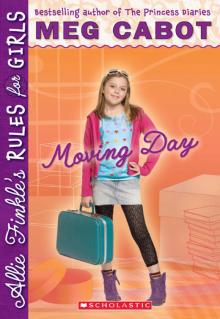 Moving Day
Moving Day Insatiable
Insatiable All American Girl
All American Girl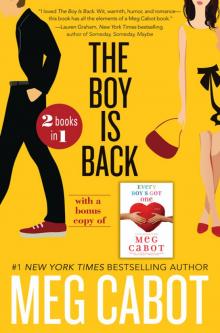 The Boy Is Back + Every Boy's Got One Bundle
The Boy Is Back + Every Boy's Got One Bundle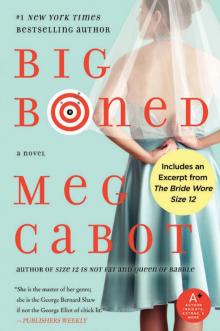 Big Boned
Big Boned Awaken
Awaken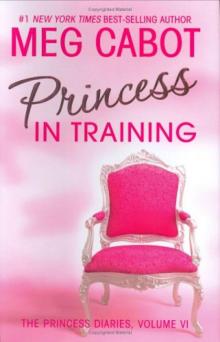 Princess in Training pd-6
Princess in Training pd-6